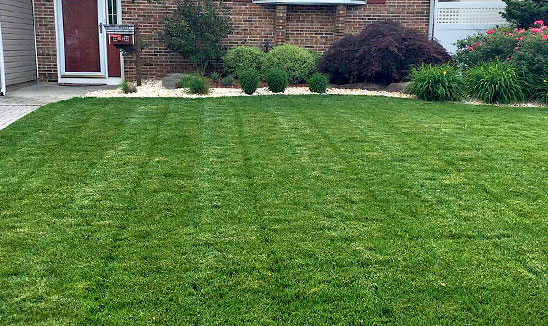Lawn over-fertilization happens more often than you think. Nevertheless, excess applications and large quantities may burn your grasses, leaving your lawn patchy, yellow, and dry. Fertilizers do an awesome job at keeping your lawn healthy, luxuriant, green, and thriving. But most homeowners who choose to fertilize their lawns sometimes make mistakes and become overzealous. Today, our experts in lawn treatments in Ballwin, MO, are here to explain how to fix your over-fertilized lawn in case you need to deal with it.
How Do You Over-fertilize a Lawn?
One of the major issues behind over-fertilization is the lack of proper soil drainage. You may have forgotten to aerate the soil a few times, or you overwatered it. The salts inside most fertilizers build up over time, burning the roots and leading to the grasses and plants’ death.
Other reasons that can account for lawn over-fertilization, according to our fertilization and weed control company in Ballwin, MO, include the following:
- Pet urine – its massive amounts of nitrogen in high concentrations can harm your lawn;
- Stressed grass (due to poor lawn maintenance) cannot absorb the minerals and nutrients from the fertilizer, becoming vulnerable to salt accumulation;
- High concentrations of chemical fertilizers applied more than necessary, etc.
No matter what causes the over-fertilization of your lawn, all excess mineral buildup in the soil will inevitably lead to yellowed or browned wasted patches of grass – fertilizer burn.
How to Fix an Over-Fertilized Lawn
Before you do anything else, first, inspect the damages. Our experts in lawn treatments in Ballwin, MO, can help you with this task and contribute to a lawn restoration program. Nevertheless, it is best to know these steps to understand how bad things are and what to do.
- Check the turf roots on various places/patches of your lawn to make an idea about how serious the problem is;
- Remove any surface fertilizer with a broom. Sweep as much granular substance you can see on top of your soil;
- Intense irrigation dilutes the salt buildup and gives the grasses a fighting chance. Make sure you water your entire lawn for at least seven days, only in the morning, to avoid the development of fungal diseases.
- Inspect the lawn and grassroots again to see if watering helped fix the over-fertilization problem.
If these simple measures do not solve the issue, you should have a professional team to help you fix the damaged lawn. Overall, the easiest way to prevent over-fertilization is to have specialized lawn treatments in Ballwin, MO, delivered by a certified company.











